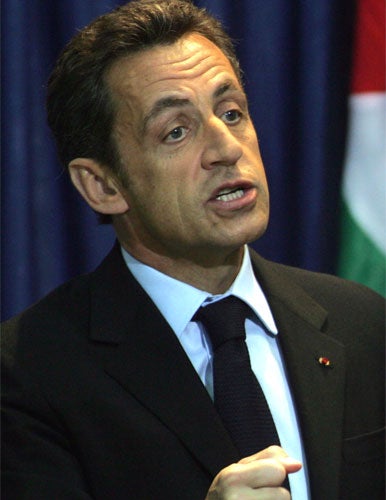Revolt at Sarkozy's attempts to open <i>Grandes Ecoles</i> to poorer students
Elite French schools reject proposed quota system

Your support helps us to tell the story
From reproductive rights to climate change to Big Tech, The Independent is on the ground when the story is developing. Whether it's investigating the financials of Elon Musk's pro-Trump PAC or producing our latest documentary, 'The A Word', which shines a light on the American women fighting for reproductive rights, we know how important it is to parse out the facts from the messaging.
At such a critical moment in US history, we need reporters on the ground. Your donation allows us to keep sending journalists to speak to both sides of the story.
The Independent is trusted by Americans across the entire political spectrum. And unlike many other quality news outlets, we choose not to lock Americans out of our reporting and analysis with paywalls. We believe quality journalism should be available to everyone, paid for by those who can afford it.
Your support makes all the difference.President Nicolas Sarkozy's crusade to break down social barriers in France has run into stubborn opposition from the elite colleges, or Grandes Ecoles, which have dominated the country's system of higher education for more than two centuries.
The government wants the Grandes Ecoles, de facto finishing schools for the haute bourgeoisie and the ruling classes, to reserve 30 per cent of their places for young people from modest or poor backgrounds. Whether this amounts to a loose "target" or a fixed "quota" to be imposed depends on which minister is speaking.
The association which represents the 220 Grandes Ecoles – some large and prestigious, others small and obscure – is digging in its heels. Any attempt to weaken entry qualifications to boost the number of grant-aided students would "lead inevitably to a lowering of standards," said the Conférence des Grandes Ecoles (CGE).
How, the CGE asked, could potential employers trust a college's final diploma if they knew that some students had been given a lower entry requirement? The Grandes Ecoles must remain the preserve of a "veritable Republican elite", it said. That phrase in particular generated furious reactions yesterday, both in the centre-right government and on the Left.
The Education Minister, Luc Chatel – who, like Mr Sarkozy, did not go through the Grandes Ecoles system – said yesterday: "To suggest that standards would be lowered by admitting students from poorer backgrounds is profoundly shocking."
Although the Grandes Ecoles are supposed to be a meritocratic system, open to the best and brightest, they have become, in effect, the machinery by which the French social and governing elite replaces itself from among its own offspring. At the most prestigious Grandes Ecoles, such as the Ecole Polytechnique engineering college or the HEC business school, only about 10 per cent of the students are poor or grant-aided.
Mr Chatel said the government plans to impose a 30 per cent quota of grant-aided students – something which the Higher Education Minister, Valerie Pécresse, has always denied.
Mme Pécresse spoke again yesterday of targets rather than quotas. She called on the Grandes Ecoles to show more "initiative and more willingness" to recruit from poorer backgrounds.
The plan was not to force the elite colleges to take under-qualified students, she said, but to persuade them to loosen the rigid entry procedures which unfairly favour students from rich or well-connected families.
The argument goes to the heart of President Sarkozy's attempts to break down social barriers in France and his attempts to revitalise the country's largely ramshackle university system.
Any French student who passes the baccalaureat (equivalent of A level) has an absolute right to attend university. To reach a Grande Ecole, a student has to go through two further years of expensive preliminary study in preparation for a series of interviews and exams.
Some of the less prestigious establishments already take a higher proportion of student from poor backgrounds. The real issue appears to be whether the dozen or so most prestigious colleges – those most prized by well-heeled, well-connected parents – should open their doors more widely to students from the white working class and the multi-racial suburbs.
The newspaper Le Monde said yesterday that the Grandes Ecoles system had probably seen its day. It was time to merge the elite colleges into the universities – precisely what the Grandes Ecoles fear most.
Top of the class: The Grandes Ecoles
* The Grandes Ecoles are descended from schools created in the 18th century to train a military and technical elite. The oldest and most prestigious colleges, such as the engineering school Ecole Polytechnique (founded 1794) still have a ceremonial uniform with a sword and cocked hat.
* The HEC, or Hautes Etudes Commerciales, founded in 1881, is one of the most respected business schools in the world.
* The other leading Grandes Ecoles include Ecole Normale Supérieure (founded 1845), Ecole des Mines (founded 1783) and Ecole des Ponts et Chaussées (founded 1747).
* Of the 2.2 million higher education students in France, around 300,000, or 14 per cent, are either in Grandes Ecoles or in the two-year classes which "prepare" for them.
* Grandes Ecoles are funded, from the public purse, far more generously than universities. The prestige of the Grande Ecoles system means that university first degrees – other than those in law or medicine – are regarded as second-rate.
Join our commenting forum
Join thought-provoking conversations, follow other Independent readers and see their replies
Comments